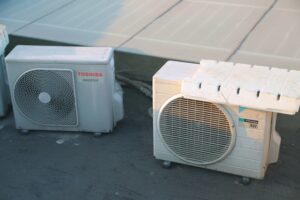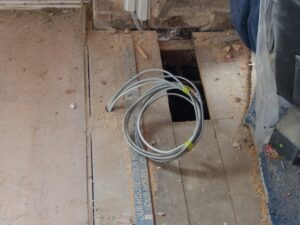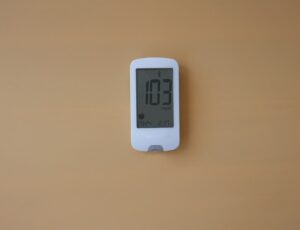Having your air conditioner leak water can be more than just a minor inconvenience – it can lead to a bigger mess if left unattended.
Leaks might cost you anywhere from $75 to $1,600, depending on the cause and how deep the damage goes. But the good news? If you catch the issue early, you could save a ton of money on repairs.
At Excel Mechanical, we know how vital it is to have a working AC, especially during those hot summer months. That’s why we focus on delivering top-tier HVAC services that are both efficient and affordable. When your AC starts leaking, you want to act fast, and we’re here to guide you through it with transparent insights into the costs and options you have.
In this blog, you will learn:
- How to identify common causes of an AC leak.
- Factors that influence repair costs.
- Practical tips to minimize future AC issues.
Don’t let a leaking AC make your home uncomfortable. If you need help, our team has the expertise to fix your AC quickly and keep it running smoothly.
Understanding AC Leaking
Air conditioning units can develop leaks, which can lead to water damage and higher repair costs. Knowing the common causes and signs of AC leaks can help prevent bigger issues by allowing for timely intervention.
Common Causes of AC Leaks
- One frequent cause of AC leaks is a blocked condensate drain line. Dirt or debris can clog the line, causing water to back up and overflow.
- Another potential issue is a cracked or rusted drain pan. Over time, wear and tear can make these pans ineffective at capturing water.
- Low refrigerant levels can also trigger leaks. When refrigerant is low, the pressure in the system drops, potentially causing moisture on the coils to freeze. Once thawed, this excess water can lead to leaking.
- Lastly, improper installation or maintenance might cause loose connections or unsealed parts, resulting in water drips.
Signs of a Leaking AC Unit
Detecting AC leaks early can prevent expensive damage.
- One sign to watch for is water pooling around the system. This might indicate a leak in the drain line or a full drain pan.
- You should also be alert for excessive humidity inside your home. An AC unit that leaks often struggles to manage moisture levels effectively, leading to a clammy indoor atmosphere.
- Mildew or mold smells can also be warning signs. These odors occur when standing water creates the perfect environment for mold growth.
- If you notice increased energy bills, this might signal an inefficient AC due to leaks. This inefficiency forces the unit to work harder, consuming more energy.
Factors Influencing Repair Costs
Understanding what drives the costs of repairing an AC leak helps you prepare financially.
Key factors include the type of your AC system, where and how severe the leak is, materials needed, and labor charges. Each of these elements plays a crucial role in determining the final expense.
Type of AC System
The kind of AC system you own affects repair costs. Different systems, like central or window units, have various parts and complexities.
- Central systems might need more intricate repairs due to their size and complexity.
- Window units, however, could be less costly to fix. If you have a ductless mini-split system, repairs might require specific expertise.
Older or uncommon AC models may also lead to higher repair costs. Parts for these systems could be harder to find and pricier.
Severity of the Leak
The seriousness of the leak has a big impact on repair costs.
Small leaks might be fixed quickly with minimal parts. Larger leaks or those causing significant water damage could take longer and require more materials. This can increase costs, especially if additional repairs are needed to address water damage in your home.
A minor leak caught early can save you money. If left unattended, a leak could escalate, damaging other parts of the system. Regular maintenance and prompt attention to leaks can keep repair costs down and your system running efficiently.
Location of the Leak
Where the leak is in your AC system also influences costs.
Leaks in easily accessible areas can be repaired faster and more cheaply than in difficult-to-reach places. For example, a leak in the indoor unit might be more convenient to fix than in the outdoor compressor or inside wall-mounted units.
Leaking refrigerant lines in hidden areas might require additional work, such as removing parts of your wall or ceiling. This increases the labor needed and the repair cost. When examining your system, consider easy detection of leaks to minimize expenses.
Cost of Materials
Materials needed for the repair contribute to the total cost.
Some leaks might only require basic replacement parts, while others need specialized components. Costs can vary depending on the availability and price of these materials. For example, refrigerant is a specific material that impacts expense, and refrigerant prices fluctuate.
By choosing high-grade materials, we aim for durability, which will save you money in the long run. It’s crucial to balance immediate costs with future benefits.
Labor Charges
Labor charges form a significant part of repair expenses.
Skilled technicians may charge more, but their expertise can prevent future issues. The time taken for a repair directly affects labor costs. Quick fixes are cheaper, while complex problems needing more time will increase the labor cost.
Selecting reputable services like Excel Mechanical guarantees experienced professionals handle your repairs. We strive to offer great value through reliable and efficient service.
By choosing us, you ensure your AC repairs are done right the first time, helping you avoid recurring issues and additional costs.
Typical Cost Breakdown
Understanding the costs of fixing an AC leaking water can help you make informed decisions. These costs can vary based on diagnostic fees, repair versus replacement expenses, and any additional costs that may arise.
Diagnostic Fees
When your AC unit leaks, the first step is diagnosing the issue.
Typically, diagnostic fees range from $50 to $100, covering the cost of a technician’s visit and assessment of the problem. This fee is crucial as it helps pinpoint whether the leak is due to clogged drain lines, refrigerant problems, or other issues.
Technicians use various tools and checks to determine the root cause. Accurate diagnosis is essential to prevent further damage and avoid wasting money on ineffective repairs. Make sure to ask any technician for a detailed explanation of the problem and how they plan to fix it.
Repair vs. Replacement Costs
Deciding whether to repair or replace your AC depends on the extent of the damage and the age of the unit.
Minor repairs like fixing drain lines may cost between $100 and $300. These repairs are manageable if the unit is relatively new and in good condition.
More extensive repairs, like a compressor replacement, can range from $1,000 to $2,500. In some cases, replacing the entire unit may be more cost-effective, particularly for older systems.
Additional Expenses
Other costs may arise during the repair process.
For example, refrigerant leaks typically cost between $200 to $1,500, depending on the severity and type of refrigerant needed. Additionally, any necessary ductwork or component upgrades might add to the expense.
Once repairs begin, unexpected issues can appear, leading to extra charges. Discussing potential costs with your technician beforehand can help you budget accordingly.
Cost-Saving Tips
There are several ways to save money when dealing with an AC leak while ensuring the issue is handled properly.
- Regular Maintenance: Schedule regular check-ups for your AC system to catch potential leaks early. This preventive measure can help you avoid costly repairs.
- DIY Solutions: For minor issues, you might be able to fix some problems yourself. Make sure to clean the filters and check for obvious signs of blockage.
- Energy Efficiency: Upgrade your AC system to a more energy-efficient model. This can reduce long-term energy costs and minimize repair needs.
| Cost-Saving Tip | Explanation |
| Regular Check-Ups | Catch issues early to prevent expensive damage. |
| DIY Fixes | Handle minor repairs yourself to cut down on labor costs. |
| Energy Upgrades | Save on utility bills with a more efficient system. |
Choosing the right professional for the job can prevent future issues and help control expenses. Prioritize quality work over quick fixes. Opting for professional help from a reliable service can be more cost-effective in the long run.
Choosing a Professional for AC Repair
When selecting a professional for AC repair, ensuring they have the right qualifications and can offer clear estimates is essential. Knowing what kind of warranty and guarantees they provide to protect your investment is also helpful.
Certifications to Look For
Checking for the right certifications is crucial when seeking an AC repair expert.
A qualified technician typically holds certifications like NATE (North American Technician Excellence) or EPA (Environmental Protection Agency) certification. These credentials ensure the technician is trained and knowledgeable about the latest HVAC standards and practices.
Having the right certifications means the technician can effectively diagnose and fix issues with your air conditioning system. This reduces the risk of further problems or inefficiencies.
Make sure the professional you choose regularly updates these certifications. This indicates ongoing training and an ability to work with newer models and technologies.
Understanding Estimates
Getting a detailed estimate for AC repair is crucial. You should ask for a breakdown of costs, including labor, parts, and additional fees. This transparency helps you understand what you’re paying for and can prevent unexpected expenses later.
Requesting estimates from multiple providers can be beneficial. It gives you a clear idea of the market rate for the needed repair work. We offer clear and detailed estimates, ensuring no surprises during the repair process.
Ask questions about what is included in the estimate. This understanding prevents miscommunication and ensures you know exactly what services you are getting.
Warranty and Guarantees
Warranties and guarantees are important when choosing an AC repair professional. A warranty on parts and labor provides peace of mind, knowing that the technician will address it without additional cost if something goes wrong.
Some companies offer different levels of guarantees. Understanding these options helps you select the one that best suits your needs. This may include guarantees for service quality or timelines for completing work.
Remember to confirm the terms of any warranty or guarantee before moving forward.
Preventive Maintenance to Avoid Future Leaks
Regular maintenance is key to preventing AC leaks.
- Start by cleaning or replacing air filters every month or two. Clogged filters can cause the AC to freeze and later leak.
- Another essential task is to inspect the condensation drain line for blockages. A clogged line can cause water to back up and leak, so keep it clear.
- Check refrigerant levels as well. Low levels can lead to freezing and potential leaks. If you notice fluctuations, it’s time to call a professional to assess the refrigerant system.
- Keep the evaporator and condenser coils clean. Dirt and debris can affect their efficiency, leading to moisture problems. Use a gentle brush or a vacuum to clean them periodically.
- Seal ductwork to ensure efficiency. Leaky ducts waste energy and can cause your system to overwork, potentially leading to leaks or other issues. Mastic or duct tape can be used to seal ductwork.
Consider setting up regular maintenance appointments to keep your system in top shape. With our expertise, Excel Mechanical ensures that preventive measures are in place, reducing the risk of leaks and extending the life of your AC unit.
Frequently Asked Questions
When your AC is leaking, it can leave you with a lot of questions, especially when trying to figure out the next steps or costs involved. Below are some of the most commonly asked questions we get about AC leaks. Let’s break them down to make sure you’re equipped with the knowledge to handle any AC leak situation.
How much does car AC leak repair typically cost?
Repairing a car AC leak can vary widely, often between $150 and $500. The cost depends on the issue, such as a leaking hose or a faulty compressor. It’s important to address leaks promptly to avoid more expensive repairs later.
What is the average cost of repairing a split AC leak?
Repairing a leak in a split AC unit typically costs between $200 and $1,500. The price varies based on the extent of the damage and the leak’s cause. For example, a refrigerant leak can significantly influence the cost.
Can window AC units be repaired if they are leaking, and what is the cost?
Window AC units can be repaired when they leak, often for $75 to $200. The cost depends on the severity of the leak and the specific repairs needed. Regular maintenance can prevent most leaks in window AC units.
What are the expected costs of central AC leak repair services?
Central AC leak repairs can range significantly from $200 to over $1,600. Factors affecting the cost include the location and severity of the leak. Addressing leaks early on can help prevent damage to your overall system.
How is an HVAC leak test priced, and is it separate from repair costs?
HVAC leak tests often cost between $50 and $150, separate from any repair fees. A leak test helps identify issues early before they require more costly repairs. This proactive measure can save money by catching problems before they worsen.
Is it more cost-effective to repair an AC leak or replace the unit?
Deciding whether to repair or replace your AC unit involves considering its age and condition. If your unit is older and experiencing frequent issues, replacement might be more cost-effective in the long run.




